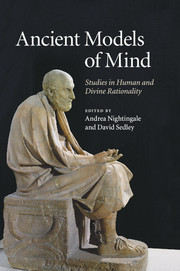Book contents
- Frontmatter
- Contents
- List of contributors
- Introduction
- 1 Plato on aporia and self-knowledge
- 2 Cross-examining happiness: reason and community in Plato's Socratic dialogues
- 3 Inspiration, recollection, and mimēsis in Plato's Phaedrus
- 4 Plato's Theaetetus as an ethical dialogue
- 5 Contemplating divine mind
- 6 Aristotle and the history of skepticism
- 7 Stoic selection: objects, actions, and agents
- 8 Beauty and its relation to goodness in Stoicism
- 9 How dialectical was Stoic dialectic?
- 10 Socrates speaks in Seneca, De vita beata 24–28
- 11 Seneca's Platonism: the soul and its divine origin
- 12 The status of the individual in Plotinus
- A. A. Long: publications 1963–2009
- Bibliography
- Index
2 - Cross-examining happiness: reason and community in Plato's Socratic dialogues
Published online by Cambridge University Press: 06 December 2010
- Frontmatter
- Contents
- List of contributors
- Introduction
- 1 Plato on aporia and self-knowledge
- 2 Cross-examining happiness: reason and community in Plato's Socratic dialogues
- 3 Inspiration, recollection, and mimēsis in Plato's Phaedrus
- 4 Plato's Theaetetus as an ethical dialogue
- 5 Contemplating divine mind
- 6 Aristotle and the history of skepticism
- 7 Stoic selection: objects, actions, and agents
- 8 Beauty and its relation to goodness in Stoicism
- 9 How dialectical was Stoic dialectic?
- 10 Socrates speaks in Seneca, De vita beata 24–28
- 11 Seneca's Platonism: the soul and its divine origin
- 12 The status of the individual in Plotinus
- A. A. Long: publications 1963–2009
- Bibliography
- Index
Summary
This essay is dedicated to A. A. Long. Tony has fostered a community of reason among his students, of whom I am privileged to be one.
INTRODUCTION: CONTESTING SOCRATIC EGOISM
There is a widespread understanding among historians of philosophy that ancient Greek ethics is largely or even entirely eudaimonist in structure. And yet, there are some deeply counter-intuitive consequences of a eudaimonist ethics. Ordinarily, we think that it is possible for us to benefit others for their own sake, a possibility that does not depend upon its being a condition of our own happiness. Egoism, the position attributed to Socrates by, e.g., Terence Irwin and Gregory Vlastos, claims that such independently arising, other-directed concern is irrational. Indeed, it seems that a growing consensus among scholars of Socratic ethics attributes to Socrates the thesis of eudaimonism, the view that an agent exclusively pursues her own wellbeing, as well as that of psychological egoism (i.e., that an agent acts in her own self-interest). According to the latter thesis, it is impossible for agents to be motivated to do anything other than what is in their own interest.
Can it really be that Socrates is to be credited with the discovery of egoistic eudaimonism? Well aware that this association looms strongly in the mind of most informed readers, in what follows I attempt to show that there is a great deal of assumption and not much by way of strong evidence to support the attribution.
- Type
- Chapter
- Information
- Ancient Models of MindStudies in Human and Divine Rationality, pp. 27 - 44Publisher: Cambridge University PressPrint publication year: 2010
- 2
- Cited by



